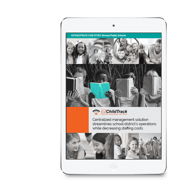
Amidst all the holiday art projects and class parties, you need to take some time to prepare your childcare center for the end of the year. As a business owner, you are responsible for more than your basic income tax preparation. Several areas are requiring your attention right about now.
Let's dive in.
Write a Business Plan
Are you trying to grow your business? Or at least make sure it survives? Write a business plan before dotting another "i."
A business plan looks three to five years into the future and is the foundation of your planning and operations. A tightly focused business plan begins by asking who your daycare will serve, what makes you stand out from a crowded market, and how you will grow your business.
Putting a business plan together will help you gather documents that help with the rest of the end-of-year sprint.
Finalize Your Income and Expenses
It's time to catch up with your payments, billing, and record-keeping.
- Invoice your clients for unpaid bills.
- Send reminders for invoices already sent.
- Write off bad debt.
- Pay your vendors and contractors.
- Update your mileage log.
- Record all business expenses and separate out your personal expenses.
- Reconcile your bank accounts.
Unless you have a reason to put off income until next year, get busy following up with clients who are slow in paying and get your December invoices sent, too.
Update Your Fixed Assets
Fixed assets are items that last more than a year, or that must be paid for annually. A couple of examples are your office computer and your marketing spending. If you purchased durable items this year, you might have forgotten to update your list. Assets that can be used for deductions include:
- Office equipment
- Playground equipment
- Toys
- Business use of your home
- Marketing expenses
- Furniture
- Other facility requirements
Once you've made that list, run a depreciation report. You can use the amount of each asset's life to write off a tax deduction.
Prepare Your Payroll
Now is the time to update your employee contact information because you will soon need to send out W-2s and Forms 1099 (to your contractors).
If you expect to pay a bonus, calculate it now and check that your payroll tax liabilities match your quarterly payroll returns. Grab an up-to-date tax schedule if you didn't get one when the Tax Cuts and Jobs Act was passed, and rollover any vacation or time off if you provide it.
The IRS changed the W-4 form, so everyone will need to update to the new form, new and existing employees alike. If you send paper copies of your employee W-2s to the Social Security Administration, fill out Form W-3.
Finally, review your worker classification for accuracy. The IRS frowns on calling individuals contractors when they are really employees.
Back-Up Your Financial Data
If there is one thing you cannot lose, it is your financial data.
Verify your profit and loss report or income statement as well as your balance sheet. Next, run a cash flow statement and key tax reports for your accountant or tax professional.
Once all your financial documentation is in order, back it up or export it to a back-up service. If you have paper files, place them in off-site storage, and check with your cloud vendor to find out how your electronic files are backed up. Ask how you can retrieve them later, too, in case of data loss or disaster.
Close the Books
Closing the books means deciding on a date past which nothing further will be added or changed in the financial records. If you have electronic files, lock them with a password to keep users out. Using childcare management software or an accounting solution can streamline this activity.
Organize Your Records and Estimate Next Year's Profit
Now that you know how much you made this year, you can estimate how much you could make next year. Use the information to inform the impact on your business taxes, such as being placed into a higher tax bracket. Also, consider how any tax changes affect your business and personal taxes.
Organize your accounts and documents from 2020 to save time and money when hiring a tax professional to help you with end-of-year tax planning and filing.
Do Your Quarterly Taxes and Save for Retirement
Make sure you paid all quarterly taxes throughout the year, and get ready to make the final payment in January 2021. Remember to pay the self-employment tax as well as federal and state income tax.
Do you have a retirement account? Many Americans haven't saved enough for retirement. The earlier you start, the better off you will be when it's time.
Start on Next Year's Tax Planning
The cycle never ends. While you wrap up this year's taxes and financials, take the time to do tax planning for the coming year. You should have a better idea where you could improve your record-keeping and what you need to do to make your end-of-year better next time.
Establish some new practices and make a resolution to get more involved with your business finances. Starting now gives you time to weigh your options instead of making rash decisions.
Tax planning for this year and next should include deciding whether to make large business purchases now or in the new year. Don't buy stuff just to reduce your taxable income. Compare the cost of the purchase to the amount of tax you owe. It may be less expensive to pay the tax.
On the other hand, if your business is growing, leaving purchases until next year might keep you from shifting into a higher bracket.
The end of year frenzy isn't just about business, though. Do your due diligence to keep your business on track going into the new year, then relax a little and celebrate the season. You've earned it this year.




